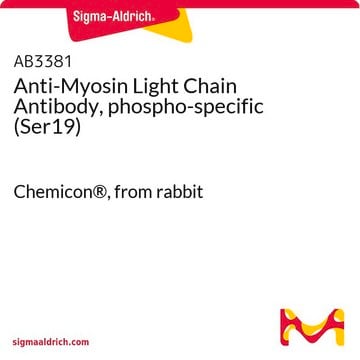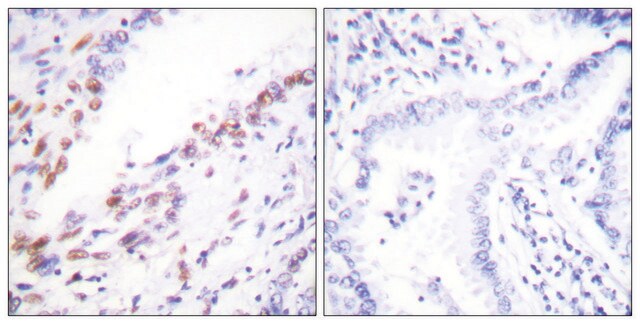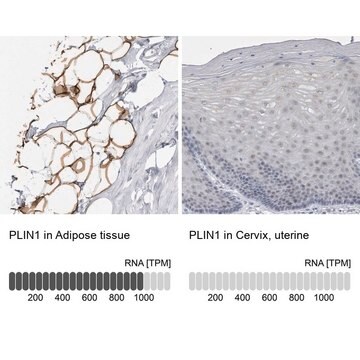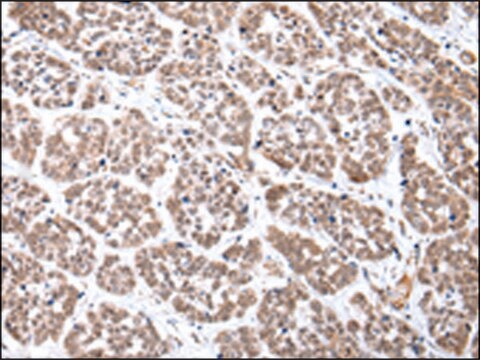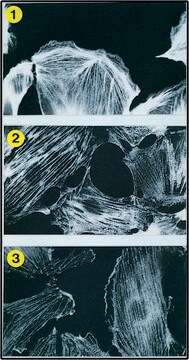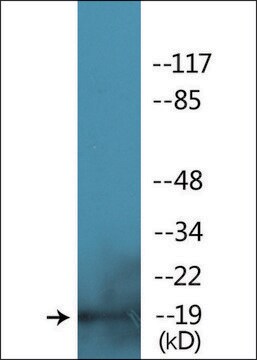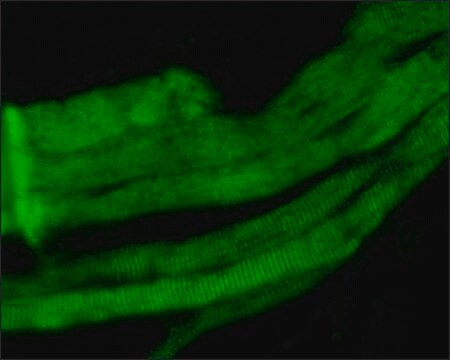추천 제품
생물학적 소스
rabbit
Quality Level
항체 형태
affinity purified immunoglobulin
항체 생산 유형
primary antibodies
클론
polyclonal
정제법
affinity chromatography
종 반응성
rat, human, mouse
제조업체/상표
Chemicon®
기술
immunocytochemistry: suitable
NCBI 수납 번호
UniProt 수납 번호
배송 상태
wet ice
타겟 번역 후 변형
unmodified
유전자 정보
human ... FOXA2(3170)
mouse ... Foxa2(15376)
특이성
Recognizes FOXA2. The calculated molecular weight is ~48.3 kDa.
면역원
Synthetic peptide corresponding to amino acids 350-361 of human and rat FOXA2 (LGPPHHPGLPPE).
애플리케이션
Anti-FOXA2 Antibody is a Rabbit Polyclonal Antibody for detection of FOXA2 also known as Forkhead Box Protein A2, Hepatocyte Nuclear Factor 3-beta, HNF3B & has been validated in ICC.
Immunocytochemistry: 1/200 to 1/1000.
Optimal dilutions must be determined by the user.
Optimal dilutions must be determined by the user.
Research Category
Epigenetics & Nuclear Function
Epigenetics & Nuclear Function
Research Sub Category
Transcription Factors
Transcription Factors
물리적 형태
Affinity purified immunogloublin precipitated in a solution of 50% saturated ammonium sulfate and PBS containing no preservatives.
저장 및 안정성
Maintain unopened vial at -20°C for up to 6 months. Avoid repeated freeze/thaw cycles.
The rehydrated antibody solutions can be stored undiluted at 2-8°C for 2 months without any significant loss of activity. Note, the solution is not sterile, thus care should be taken if product is stored at 2-8°C.
For storage at -20°C, the addition of an equal volume of glycerol can be used, however, it is recommended that ACS grade or higher glycerol be used, as significant loss of activity can occur if the glycerol used is not of high quality.
For freezing, it is recommended that the rehydrated antibody solution be further diluted 1:1 with a 2% BSA (fraction V, highest-grade available) solution made with the rehydration buffer. The resulting 1% BSA/antibody solution can be aliquoted and stored frozen at -70°C for up to 6 months. Avoid repeated freeze/thaw cycles
PREPARATION AND USE:
To reconstitute the antibody, centrifuge the antibody vial at moderate speed (5,000 rpm) for 5 minutes to pellet the precipitated antibody product. Carefully remove the ammonium sulfate/PBS buffer solution and discard. It is not necessary to remove all of the ammonium sulfate/PBS solution: 10 μL of residual ammonium sulfate solution will not effect the resuspension of the antibody. Do not let the protein pellet dry, as severe loss of antibody reactivity can occur.
Resuspend the antibody pellet in any suitable biological buffer, standard PBS or TBS (pH 7.3-7.5) are typical. Volumes required are not critical but it is suggested that the final antibody concentration be between 0.1 mg/mL and 1.0 mg/mL. For example, to achieve a1 mg/mL concentration with 50 μg of precipitated antibody, the amount of buffer needed would be 50 μL.
Carefully add the liquid buffer to the pellet. DO NOT VORTEX. Mix by gentle stirring with a wide pipet tip or gentle finger-tapping. Let the precipitated antibody rehydrate for 1 hour at 4-25°C prior to use. Small particles of precipitated antibody that fail to resuspend are normal. Vials are overfilled to compensate for any losses.
The rehydrated antibody solutions can be stored undiluted at 2-8°C for 2 months without any significant loss of activity. Note, the solution is not sterile, thus care should be taken if product is stored at 2-8°C.
For storage at -20°C, the addition of an equal volume of glycerol can be used, however, it is recommended that ACS grade or higher glycerol be used, as significant loss of activity can occur if the glycerol used is not of high quality.
For freezing, it is recommended that the rehydrated antibody solution be further diluted 1:1 with a 2% BSA (fraction V, highest-grade available) solution made with the rehydration buffer. The resulting 1% BSA/antibody solution can be aliquoted and stored frozen at -70°C for up to 6 months. Avoid repeated freeze/thaw cycles
PREPARATION AND USE:
To reconstitute the antibody, centrifuge the antibody vial at moderate speed (5,000 rpm) for 5 minutes to pellet the precipitated antibody product. Carefully remove the ammonium sulfate/PBS buffer solution and discard. It is not necessary to remove all of the ammonium sulfate/PBS solution: 10 μL of residual ammonium sulfate solution will not effect the resuspension of the antibody. Do not let the protein pellet dry, as severe loss of antibody reactivity can occur.
Resuspend the antibody pellet in any suitable biological buffer, standard PBS or TBS (pH 7.3-7.5) are typical. Volumes required are not critical but it is suggested that the final antibody concentration be between 0.1 mg/mL and 1.0 mg/mL. For example, to achieve a1 mg/mL concentration with 50 μg of precipitated antibody, the amount of buffer needed would be 50 μL.
Carefully add the liquid buffer to the pellet. DO NOT VORTEX. Mix by gentle stirring with a wide pipet tip or gentle finger-tapping. Let the precipitated antibody rehydrate for 1 hour at 4-25°C prior to use. Small particles of precipitated antibody that fail to resuspend are normal. Vials are overfilled to compensate for any losses.
법적 정보
CHEMICON is a registered trademark of Merck KGaA, Darmstadt, Germany
면책조항
Unless otherwise stated in our catalog or other company documentation accompanying the product(s), our products are intended for research use only and are not to be used for any other purpose, which includes but is not limited to, unauthorized commercial uses, in vitro diagnostic uses, ex vivo or in vivo therapeutic uses or any type of consumption or application to humans or animals.
적합한 제품을 찾을 수 없으신가요?
당사의 제품 선택기 도구.을(를) 시도해 보세요.
Storage Class Code
12 - Non Combustible Liquids
WGK
WGK 2
Flash Point (°F)
Not applicable
Flash Point (°C)
Not applicable
시험 성적서(COA)
제품의 로트/배치 번호를 입력하여 시험 성적서(COA)을 검색하십시오. 로트 및 배치 번호는 제품 라벨에 있는 ‘로트’ 또는 ‘배치’라는 용어 뒤에서 찾을 수 있습니다.
Maryam Mahmoodinia Maymand et al.
Artificial cells, nanomedicine, and biotechnology, 46(4), 853-860 (2017-07-12)
The application of stem cells holds great promises in cell and tissue transplants. This study was designed to compare the hepatogenic differentiation of iPSCs on aligned PES/COL versus random. Aligned and random PES/COL nanofibrus scaffolds were fabricated by electrospining and
Abdulshakour Mohammadnia et al.
Journal of cellular physiology, 231(9), 1994-2006 (2016-01-13)
The generation of definitive endoderm (DE) from pluripotent stem cells (PSCs) is a fundamental stage in the formation of highly organized visceral organs, such as the liver and pancreas. Currently, there is a need for a comprehensive study that illustrates
Saiyong Zhu et al.
Nature protocols, 10(7), 959-973 (2015-06-05)
Induction of tissue-specific cell types via a conventional transdifferentiation strategy typically uses overexpression of the corresponding lineage-specific transcription factors. Alternatively, somatic cells can be temporarily activated via a common set of reprogramming factors into a transition state, which can then
Ninuo Xia et al.
Scientific reports, 6, 20270-20270 (2016-02-05)
Generation of induced dopaminergic (iDA) neurons may provide a significant step forward towards cell replacement therapy for Parkinson's disease (PD). To study and compare transcriptional programs of induced cells versus primary DA neurons is a preliminary step towards characterizing human
Afshin Noori et al.
Cell journal, 25(6), 372-382 (2023-07-12)
Efficient production of functional and mature alveolar epithelial is a major challenge for developing any cell replacement therapy for lung degenerative diseases. The extracellular matrix (ECM) pro-vides a dynamic environment and mediates cellular responses during development and maintenance of tissue
자사의 과학자팀은 생명 과학, 재료 과학, 화학 합성, 크로마토그래피, 분석 및 기타 많은 영역을 포함한 모든 과학 분야에 경험이 있습니다..
고객지원팀으로 연락바랍니다.